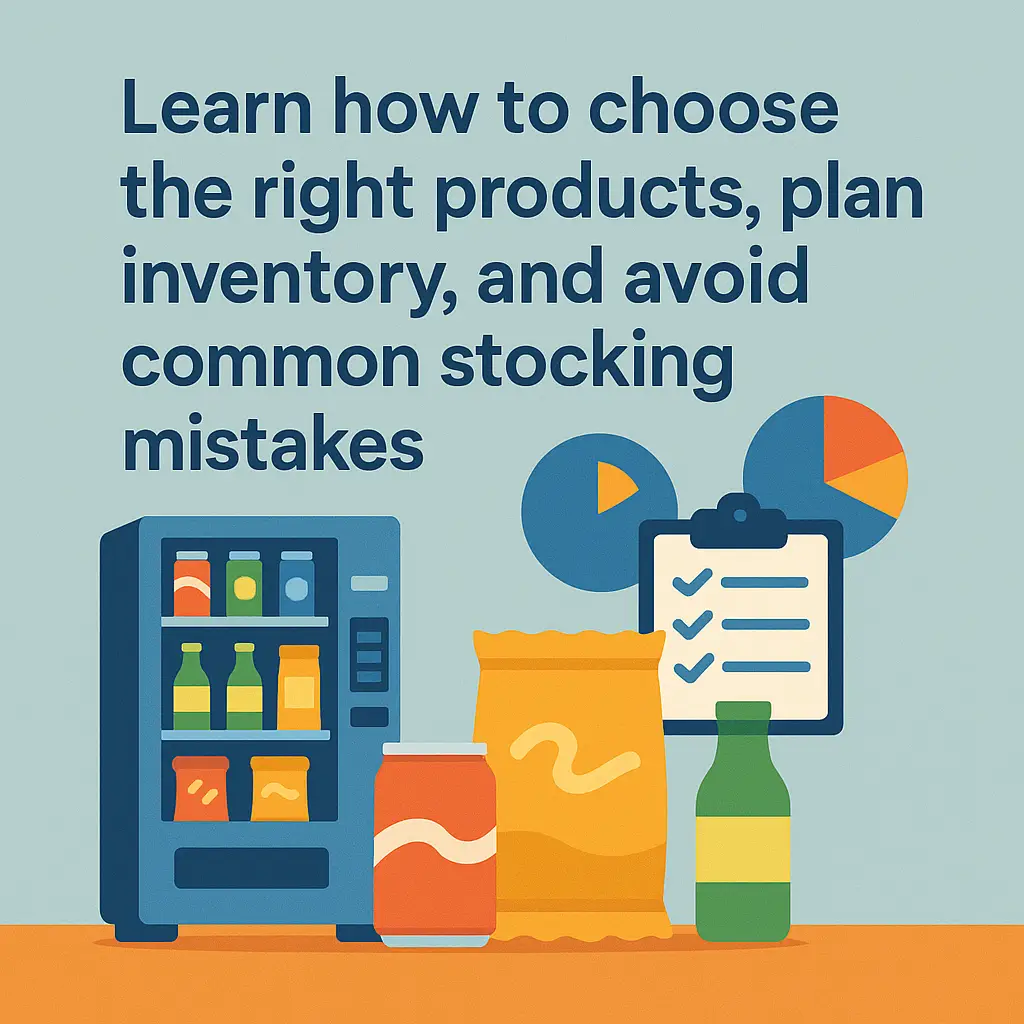How to Stock Your First Vending Machine
Learn how to choose the right products, plan inventory, and avoid common stocking mistakes.
Back to Vending Business Startup ResourcesLearn how to choose the right products, plan inventory, and avoid common stocking mistakes.
Back to Vending Business Startup ResourcesStart your 30-day free trial and get instant SMS and email alerts whenever a local business needs vending service. These are real location leads to help you grow your route — you decide which ones to buy, no obligations or contracts.
![]() Stock with a mix of high-demand and healthy products
Stock with a mix of high-demand and healthy products
![]() Track sales data to adjust product choices over time
Track sales data to adjust product choices over time
![]() Start with conservative inventory levels to reduce waste
Start with conservative inventory levels to reduce waste
30 days free, then $39 / month.
No Commitment. Cancel Anytime.

Stocking your first vending machine can be both exciting and overwhelming. The key is knowing your audience, location type, and how to track sales performance early on. Start by researching product preferences commonly found in similar vending setups. A balanced mix of chips, candy, bottled water, sports drinks, and healthy snacks tends to perform well in most environments.
However, don’t overload the machine from day one. Instead, select a few core products in each category and stock low quantities. This strategy keeps your initial investment lower while giving you the flexibility to test product performance. Reviewing sales after the first few weeks will offer valuable insights into which items move and which don’t.
Use smart vending software, if available, to track inventory data and reduce manual checks. Utilize expiry dates to guide restocking priorities and rotate products according to their shelf life. A major pitfall for new vendors is stocking items that expire before they sell, which directly cuts into profit.
Think about the environment your machine is in: schools often favor healthier snacks, while workplaces may lean toward caffeine and quick meals. Consider seasonal swaps, such as hot drinks in winter or cold energizers during the summer months. Adjusting your offering to match customer behavior through the year keeps your machine relevant and profitable.
If your location has slower foot traffic, avoid overloading with perishable goods. Instead, opt for longer shelf-life items. For more tips on aligning your inventory with foot traffic patterns, check out our insights on high vs. low traffic vending locations.
Before stocking your first machine, learn what questions to ask the location to ensure product fit. Our guide on evaluating vending machine locations can help you avoid mismatches and wasted inventory.
Vending Exchange connects vending operators with real businesses actively looking for vending services—including traditional machines, AI coolers, and office coffee. Get instant SMS and email alerts when new opportunities are available in your area. No contracts or monthly fees—just buy the leads you want. Start your free 30-day trial today and grow your vending business on your terms.
Start with popular staples like chips, bottled water, energy drinks, and a few healthy snacks. Adjust as you learn customer preferences.
Begin with small quantities across multiple categories and monitor sales closely to learn what sells best at your location.
Keep initial stock levels conservative. Aim for enough to test preferences without risking waste from expired items.
Many vending machines offer smart tracking software that provides data on product sales, stock levels, and refills needed.
It depends on foot traffic and product turnover. Weekly is typical, but monitor until a pattern forms.
You risk products expiring before being sold, leading to direct profit loss and wasted investment.
Research what similar locations are stocking and tailor based on environment—schools may prefer healthy items, offices may lean toward caffeinated beverages.
Yes. Regularly evaluate which products perform and replace underperformers to boost sales and keep variety fresh.
Use shelf-stable items and reduce quantity to avoid spoilage in slower-moving machines.
Offering seasonal snacks or drinks can attract repeat interest and increase engagement throughout the year.